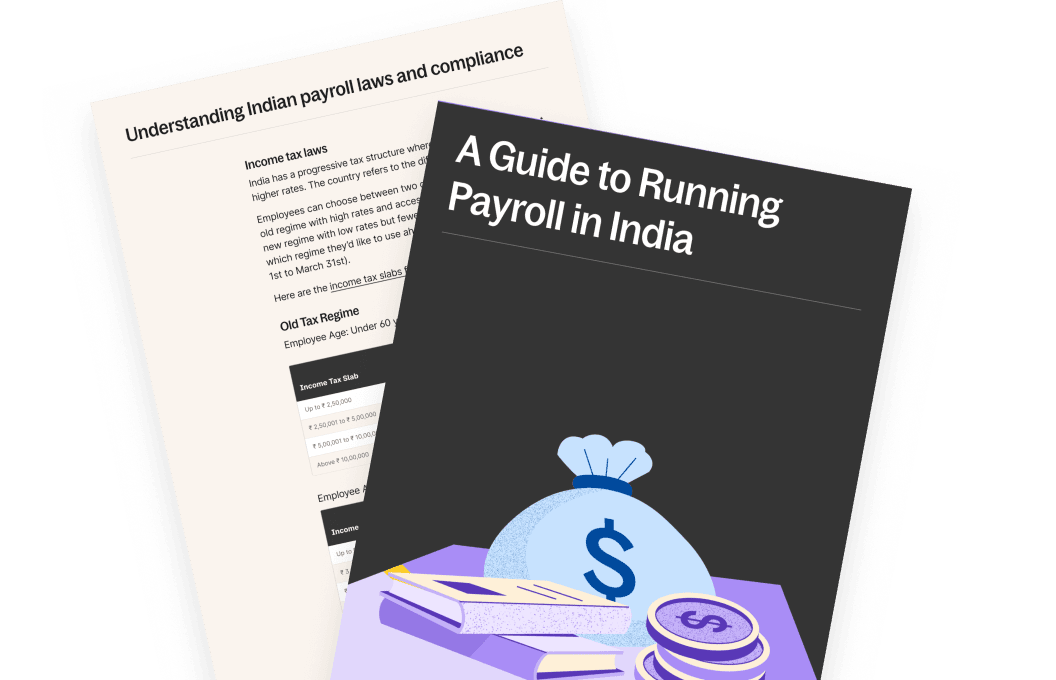Guide
A Step-by-Step Guide to India’s Payroll Process
Global payroll

Get the resource for free
New to managing payroll in India?
India is among the world’s fastest-growing economies, projected to be the fourth-largest globally by 2026. It also produces the second-highest number of STEM graduates annually, making it a prime destination for international businesses looking to tap into top talent.
But expanding into India isn’t straightforward. The payroll process in India includes unique regulations at national and state levels, complex tax regimes, and detailed compliance requirements. To confidently hire and pay employees in India, companies must thoroughly understand the local payroll process.
Who is this guide for?
-
Startup founders entering the Indian market
-
Global payroll managers overseeing Indian payroll
-
HR professionals managing employee onboarding
-
Compliance and finance teams expanding internationally
Managing payroll in complex environments like India is a challenge. Thanks to Deel, I have confidence we’re 100% compliant every step of the way.
—Tina Katna, HRBP,
Ubie
What's included in this payroll guide?
Our detailed guide—updated for 2026—covers everything you need to master the India payroll process:
-
Understanding India's payroll laws: Taxes, requirements for statutory deductions, and contributions (EPF, ESI, LWF)
-
Employee income tax regimes: How employees choose between India's old and new tax systems
-
Statutory contributions explained: In-depth look at Employee Provident Fund (EPF), Employee State Insurance (ESI), and Labour Welfare Fund (LWF)
-
Payroll setup essentials: Documentation required, configuring payroll systems, and salary disbursement options
-
Benefits and leave management: Gratuity calculation, parental leave, minimum wage regulations, and overtime pay
-
Payroll solutions comparison: Evaluating in-house, outsourced, and hybrid payroll solutions
Why India’s payroll process is complex—and how to simplify it
India's payroll compliance is layered and constantly evolving. Businesses must navigate:
-
Dual tax regimes: Old and new systems with varying rates and deductions
-
Statutory requirements for contributions: EPF, ESI, and LWF, all with unique rules and deadlines
-
Strict compliance requirements: Monthly filings, detailed payroll records, and regulated payment methods
Mistakes can result in severe penalties and operational delays. Our guide to running payroll in India simplifies the entire process, giving you a clear roadmap for compliant, efficient payroll processing. You can also learn how to reduce payroll costs in India for optimized operations.
Benefits of this step-by-step guide
By downloading this guide, you'll:
- Avoid costly compliance mistakes
- Save hours on payroll setup research
- Accurately manage employee compensation and deductions
- Keep pace with India’s frequently changing payroll regulations
Your payroll setup in India: 5 essential steps
-
Collect essential documents: Ensure you have CIN, PAN, TAN, EPFO, and ESIC registrations
-
Configure payroll systems: Integrate with TDS, EPF, ESI, and state LWF platforms to automate compliance
-
Choose reliable salary payment methods: Electronic transfers (NEFT or IMPS) are preferred for accuracy and convenience
-
Gather employee information: Secure the necessary details, including bank account, Aadhaar, PAN, and tax declarations
-
Implement systems for statutory filings and payments: Automate payroll processes, including statutory filings, monthly tax deductions, and timely employee payments
Watch the video below to see what the employee onboarding experience is like when running payroll in India with Deel.
Simplify payroll in India with Deel
Deel offers powerful payroll solutions specifically designed for businesses navigating India's complex payroll environment:
-
Payroll: Centralized management for accurate salary payments, tax filings, and statutory reporting, with real-time G2N calculations
-
Employer of Record (EOR): Quickly hire and pay employees without needing your own legal entity in India
-
Independent Contractor Management: Easily hire, manage, and pay independent contractors in India and abroad
Ready to simplify your India payroll process? Speak to a payroll specialist.
FAQs
What is involved in the India payroll process?
India’s payroll process includes managing dual tax regimes, EPF and ESI contributions, Labour Welfare Fund payments, payroll documentation, and compliance with state-specific labor laws.
How do I ensure compliance with payroll taxes in India?
Compliance requires timely monthly tax payments, filing Form 24Q quarterly, issuing Form 16 annually, and maintaining accurate payroll records. Work with certified payroll and legal experts to ensure full compliance with local, state, and country-wide requirements.
Can I run payroll in India without a local entity?
Yes. Deel’s Employer of Record (EOR) in India allows you to legally hire and pay employees without your own local entity.
What’s the difference between EPF, ESI, and LWF?
EPF (Employee Provident Fund) is a mandatory retirement scheme requiring both employer and employee contributions. ESI (Employee State Insurance) provides health and social security coverage for eligible employees. LWF (Labour Welfare Fund) varies by state and supports workers' healthcare, education, and housing.
Get your free India payroll guide today
Make expanding to India smooth and compliant. Download our comprehensive payroll guide now and start simplifying your payroll management today.